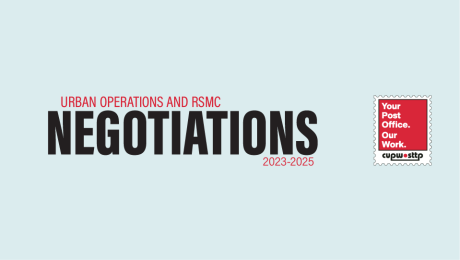News and Events
Share This
Media Enquiries
Events Calendar
By Issue
- Convention 2019 (1) Apply Convention 2019 filter
- Convention 2023 (2) Apply Convention 2023 filter
- Postal Banking (3) Apply Postal Banking filter
- Urban and RSMC Negotiations 2015-2016 (5) Apply Urban and RSMC Negotiations 2015-2016 filter
- Urban and RSMC Negotiations 2017-2018 (2) Apply Urban and RSMC Negotiations 2017-2018 filter
- Urban and RSMC Negotiations 2021-2022 (1) Apply Urban and RSMC Negotiations 2021-2022 filter
- Urban and RSMC Negotiations 2023-2025 (1) Apply Urban and RSMC Negotiations 2023-2025 filter
By Subject
- Benefits (1) Apply Benefits filter
- Canada Post (10) Apply Canada Post filter
- Child Care (1) Apply Child Care filter
- Collective Bargaining (14) Apply Collective Bargaining filter
- Environment (1) Apply Environment filter
- External Organizing (1) Apply External Organizing filter
- Job Loss (2) Apply Job Loss filter
- Labour Movement and Coalitions (3) Apply Labour Movement and Coalitions filter
- Mail Collection and Delivery (2) Apply Mail Collection and Delivery filter
- Politics (1) Apply Politics filter
- Privatisation and Deregulation (1) Apply Privatisation and Deregulation filter
- Retirement (1) Apply Retirement filter
- Service Expansion (5) Apply Service Expansion filter
- Service Reduction (2) Apply Service Reduction filter
- Union Governance (12) Apply Union Governance filter
- Women (1) Apply Women filter
- Workload & Measurement (1) Apply Workload & Measurement filter
By Type
- Program of Demands (1) Apply Program of Demands filter
- (-) Remove Publications filter Publications
- (-) Remove Perspective filter Perspective
- Ratification Materials (1) Apply Ratification Materials filter
- (-) Remove Reports filter Reports
- (-) Remove Trustees Report filter Trustees Report
- Surveys & Polls (1) Apply Surveys & Polls filter
By Date
- 2023 (6) Apply 2023 filter
- 2021 (3) Apply 2021 filter
- 2020 (3) Apply 2020 filter
- 2019 (1) Apply 2019 filter
- 2018 (2) Apply 2018 filter
- 2016 (5) Apply 2016 filter
- 2015 (2) Apply 2015 filter
- 2014 (2) Apply 2014 filter
- 2013 (4) Apply 2013 filter
- 2012 (3) Apply 2012 filter
- 2011 (3) Apply 2011 filter
- 2010 (2) Apply 2010 filter
- 2001 (1) Apply 2001 filter
CUPW National Office
377 Bank Street
Ottawa, Ontario K2P 1Y3
Canada
Tel: (613) 236-7238
Fax: (613) 563-7861
TTY: (613) 236-9753
By Committee
By Audience
By Format
Showing 21 - 30 of 37 results
Pages
Friday August 16 2013
Tuesday March 12 2013
Pages
Latest Content
Wednesday December 10 2014
Bloodied, but unbowed, CUPW members from coast to coast to coast are feeling the impact of postal transformation and Canada Post’s cuts. Perspective asked activists in every Region about their experience in the workplace. Here’s what they had to say:
Friday May 9 2014
A round-up of Save Canada Post campaign actions from throughout the union
Tuesday November 19 2013
Volume 41, Number 4, November 2013 - Postal unions and groups stood before a giant piggy bank emblazoned with the words “Banking on a Future for Canada Post” and called for financial and banking services at post offices during a media conference on October 16th.
Friday August 16 2013
(Volume 41, Number 3, August 2013) People like the idea of Canada Post making money through financial services according to a poll commissioned by CUPW. Close to two out of every three respondents (63%) to a Stratcom poll supported Canada Post expanding revenue-generating services, including financial services like bill payments, insurance and banking.
Wednesday May 15 2013
Our union must be an active and strong force in shaping the direction of the postal service and the political context in which we work. This publication contains an overview of the work we need to do on important issues like the attack on the Rand formula, Postal Transformation, the Canadian Postal Service Charter, service expansion and reduction at Canada Post and the federal election. These inter-related issues affect our jobs, our communities and the public postal service. We need to work toward a future where our rights are respected, workers are treated with dignity and respect, and public services are valued and strengthened. We encourage every member to get involved in these campaigns.
Tuesday March 12 2013
Volume 41, Number 1, March 2013 - CUPW members in both the urban and rural bargaining units have ratified their respective collective agreements. Both agreements were achieved only after lengthy negotiations. In the case of the urban unit, the settlement was negotiated as part of the final offer selection process established pursuant to the back-to-work legislation imposed by the Harper government. The rural agreement was reached as part of a negotiated settlement without government intervention, but the possibility of back-to-work legislation was a factor in the union’s decision to recommend acceptance.
Friday October 26 2012
Message from the negotiating committee - The National Executive Board (NEB) has decided to put the tentative collective agreement to a vote of the membership. If the membership supports the NEB recommendation, the changes will be incorporated into the collective agreement, which will remain in force until December 31, 2015 or until the parties obtain the right to lockout or strike. If the membership does not ratify the tentative agreement, the NEB will decide our course of action. After many frustrating months we have reached the point where we believe it is appropriate to put the decision into the hands of the membership. We are supporting this agreement not only because it contains some significant improvements, but also because we are aware of the level of uncertainty that exists in collective bargaining in the federal sector. Considering the experience of other unions in the rail and airline sectors, and also the experience of the CUPW urban operations unit, we believe there is no guarantee of success if we pursue the conciliation/strike route at this time. The anti-labour bias of the Harper government has only served to reinforce the hardline that has been taken by Canada Post management during the entire length of negotiations.
Friday October 26 2012
Message From the National Executive Board - Brothers and Sisters - The National Executive Board (NEB) is asking you to decide on the tentative agreement because we believe that such an important decision must be placed in the hands of all of the members who will have to live with its consequences. The choices are very difficult because of the terms of the back-to-work legislation passed by the Harper government and the extreme position that was adopted by Canada Post management during the arbitration process, before it was temporarily stopped by the court. The back-to-work legislation imposed a Final Offer Selection process in which the government-appointed arbitrator must operate under a mandate heavily biased in favour of the employer. The situation is further worsened by the position taken by CPC management that they consider there to be dozens of issues in dispute, all of which could be included in their final offer should the arbitration proceed. Despite the justice of our position and the experience and expertise of our negotiating committee, we are in a very difficult position.
- ‹ previous
- 3 of 4
- next ›
Support Postal Banking - Download and Sign the Petition
Canada needs a postal bank. Thousands of rural towns and villages in our country do not have a bank, but many of them have a post office that could provide financial services. As well, nearly two million Canadians desperately need an alternative to payday lenders. A postal bank could be that alternative. Download and sign the petition urging the Government of Canada to instruct Canada Post to add postal banking, with a mandate for financial inclusion.
Latest Content
Tuesday May 27 2025
The Union has now heard back from Canada Post through the federal mediators. The Employer has proposed to return to the bargaining table Wednesday (May 28) to provide the Union with a response to our latest proposals.
Sunday May 25 2025
Union negotiators and the National Executive Board spent the last few days, and nights, reviewing the Employer’s last offers and preparing responses to issues in the offers and issues important to the Union that the Employer failed to acknowledge.
Friday May 23 2025
Today, May 23, is the first day of a nationwide overtime ban. As of 12:01 a.m. today, members were called on to refuse to work more than eight hours a day and more than 40 hours a week. This is a legal strike action and all CUPW members must follow this direction.
Thursday May 22 2025
The National Executive Board has called for a nationwide overtime ban effective May 23 at 12:00 am local time. That means members are being called on to refuse to work any more than eight hours in a day and refuse to work more than forty hours in a week.
Wednesday May 21 2025
Today, May 21, our negotiation committees received global offers from Canada Post for both the Urban Postal Operation (UPO) and the Rural and Suburban Mail Carriers (RSMCs) bargaining units. The Negotiators are currently reviewing and analyzing the offers’ contents. We will provide a more in-depth analysis shortly, but here are some of the main elements of the offers below...
Wednesday May 21 2025
After walking away from the table for the third time, Canada Post will finally table their global offers today. Our negotiating committee is currently on the way to receive the proposals.
Wednesday May 21 2025
This year, CUPW is proud to celebrate the Pride season under the theme "Workers United Against Hate" proposed by the Canadian Labour Congress. As we face a shocking rise in anti-LGBTQ hate in Canada and around the world, this theme is more important than ever.
Tuesday May 20 2025
On Monday, May 19, CUPW issued a 72-hour strike notice to Canada Post. This action was not taken lightly, but it was done for several reasons.
The collective agreements for the Urban Postal Operations and the Rural and Suburban Mail Carriers bargaining units, which were extended by the Government in December 2024, are set to expire Friday, May 23 at midnight.
Friday May 16 2025
Commissioner Kaplan’s report of the Industrial Inquiry Commission skews heavily in favour of Canada Post’s positions and recommendations. We fundamentally disagree with the bulk of its recommendations and challenge some of the information on which it was based. We have also objected to the entire process, but we felt that we had to participate in order to give voice to postal workers. The report also outlines three possible steps forward after May 22. It is important to note that this is not a done deal. It is up to Minister Patty Hajdu to decide what to do with the report – if anything at all.
Friday May 16 2025
May 18 is Tamil Genocide Remembrance Day. Every year, on this day, we remember the Tamil people who have died since 1948 because of the genocide committed against the Tamil people by the Sri Lankan state, including the massacre in Mullivaikkal, Sri Lanka, in May 2009.
- ‹ previous
- 3 of 182
- next ›

Our Events Calendar lets you stay up to date.
We also issue bulletins and media releases to our members and the media.
Popular Issues
Copyright © 2025 Canadian Union of Postal Workers and its licensors. All rights reserved.
Copyright © 2025 Syndicat des travailleurs et travailleuses des postes et ses concédants. Tous droits réservés.






